5 Ways Potassium Supplements May Improve Your Health
by James Denlinger Digital Marketing StrategistYou may already know a bit about potassium but you may not know the benefits of potassium supplements. Its most common source is bananas and one of its common uses is to help prevent cramps, but it is an even more essential nutrient than you may realize. Potassium is a common mineral that your body requires for almost everything, from proper kidney and heart function to nerve transmission and muscle contraction. It is, in fact, the third most abundant mineral in the human body.The amount of potassium you need can vary based on your age, gender and overall health but everyone needs some amount of potassium in order for the body to function properly.
Despite the fact that potassium is the eighth most abundant element on our planet and makes up about 2% of the Earth’s crust, potassium never occurs freely in nature because of its high chemical reactivity. Up until the 18th century, researchers did not distinguish between potassium and sodium because chemistry had not advanced enough to differentiate properly between the elements. An English chemist named Sir Humphry Davy was the first to isolate potassium by itself in 1807.
What is Potassium?
Do you really need potassium? Yes, you definitely do. Potassium is one of the most important and most abundant minerals in the human body. It helps regulate body fluids, promote healthy organ function and support muscle contractions. It is classified as an electrolyte because it is highly reactive in water. When you dissolve potassium in water it produces positively charged ions, which conducts electricity. This is absolutely essential for many different processes in the body. According to studies, a diet rich in potassium may be linked to reduced blood pressure and more efficient water retention. It may also reduce the risk for cardiovascular problems, kidney damage and bone loss.
What are Electrolytes?
Potassium is also a very important electrolyte. Electrolytes are substances that the body needs to perform essential processes like proper hydration, muscle function and regulating pH levels. They are formed by substances that give off either positive or negative ions when they come into contact with a solvent. The most important solvent for the human body is water.
When it comes to human health, some of the most important electrolytes in the body are:
Where is Potassium Located in the Body?
Potassium is the third most abundant mineral in the human body. About 98% of your body’s potassium is located inside the cells and 80% of that is in the muscle cells specifically. The rest is found in your bones, liver and red blood cells. But your body does not create potassium naturally, so you have to make sure you are getting enough through your diet. Thankfully it’s abundant in many different foods, especially fruits, vegetables and fish.
In specific cases, people may also choose to take potassium supplements to increase their intake. However, always consult a doctor before taking any supplement to determine if it’s right for your body.
 PIN IT
PIN ITWhat are Potassium Supplements Used for?
While most people will get their recommended daily amount of potassium from their diet, there are cases where people may need to take a supplement. For example, supplements may help alleviate a potassium deficiency that may result from things like medication or eating disorders. Supplements may help with:
- Cardiovascular health
- Bone & joint health
- Central nervous system function
- Fluid balance
Blood Pressure & Heart Health
Eating foods that contain plentiful amounts of potassium is important to encourage heart health. Researchers associate low potassium levels with an increased risk for heart disease, high blood pressure and stroke. Research has not identified exactly how it works, but potassium may prevent calcium from building up in the arteries and problems may occur in the body if sodium levels get too high.
Bone & Joint Health
Over time, the diet in western societies has changed drastically, shifting to a more animal-based diet. According to studies, animal-based diets contain more acid precursors than base precursors, which can cause acid to accumulate in the body. The bone base helps neutralize acid load, but if it builds up it may damage bone mass and increase the risk for osteoporosis.
Central Nervous System Protection
Potassium is an integral part of the central nervous system. Its electrolyte properties help transfer electrical messages back and forth between the brain and the rest of the body. It’s involved in regulating reflexes, muscle contractions and heartbeat. Sodium and potassium are responsible for moving nerve impulses in and out of cells, respectively. According to studies, low levels of potassium can reduce nerve impulse transmission.
Fluid Balance & Hydration
The human body is made up of mostly water. 60% of it is in extracellular fluid (ECF) with the 40% remainder being found in intracellular fluid (ICF). ECF is directly related to sodium and ICF is related to potassium because they are the primary electrolytes in their respective fluids. Potassium regulates the fluid inside the cells and sodium regulates what’s outside. The relationship between intracellular and extracellular fluid is called osmolality and it should be an equal balance.
However, sometimes the relationship falls out of balance. When that happens, fluid moves either inside or outside of the cell depending on which is lacking electrolytes. If there’s too much fluid inside the cell, it can swell and burst. On the other hand, if there’s too much fluid outside the cell, it can shrink. According to studies, poor fluid balance can cause dehydration and affect the heart and kidneys.
Nutrition
Potassium is present in a wide variety of foods and the best way to get enough of it naturally is to get it through your diet. Some of the common foods with potassium include:
- Bananas
- Orange juice
- Spinach
- Whole wheat bread
- Peaches
- Potatoes
- Collard greens
- Kale
- Sweet or hot peppers
What is Hypokalemia?
Hypokalemia is characterized by extremely low levels of potassium in the blood. It’s a metabolic imbalance that results from diuretic medications, kidney disorders, large doses of penicillin or magnesium deficiency. It does not occur on its own. These factors cause the patient to lose excessive amounts of potassium sweat, urine or bowel movements.
In most cases, hypokalemia does not cause any noticeable symptoms. But in other cases, it can cause severe damage to the muscles, making them very weak and leading to paralysis and respiratory failure.
How Much Potassium Do You Need a Day?
How do you know how much potassium you need in a day? The recommended daily intake of potassium varies widely depending on your age, size and gender. Other factors include your level of physical activity and health status.
According to the World Health Organization, people should get about 3,500 to 4,700 mg of potassium every day. However, each person’s recommended daily intake may be different. Consult a physician or nutritionist to confirm how much calcium you need per day.
Potassium Supplements & Dosages
There are a number of different forms of potassium supplement that may be helpful for you after consulting a physician or nutritionist for approval.
- Potassium aspartate powder: 100-500 mg per day
- Potassium orotate powder: 400 mg per day
- Potassium gluconate powder: 435 mg per day
- Potassium bicarbonate powder: 180 mg per day
- Potassium citrate powder: 275 mg per day
- Potassium chloride crystallized powder: 135 mg per day with food and water
Possible Side Effects of Potassium Supplements
Check with your doctor to decide if potassium supplements are right for you. The supplement is likely safe in appropriate doses. Side effects may include:
Taking too much potassium is not safe and can cause more serious side effects such as:
- Burning or tingling
- Weakness
- Paralysis
- Listlessness
- Dizziness
- Confusion
- Low blood pressure
- Irregular heart rhythm
Warnings & Precautions
It may also interact with certain medications, such as high blood pressure medications. Also, it may cause complications in patients with digestive disorders. It is likely safe for pregnancy, but taking too much of it is unsafe.
What is Hyperkalemia?
Hyperkalemia is when your body has very levels of potassium in your blood. Common causes include kidney disease, diets high in potassium, medications, burns and severe injuries, poorly managed diabetes and potassium substitutes or supplements. Most of the time it does not cause symptoms, but if it does, they are usually non-specific—nausea, chest pain, shortness of breath, heart palpitations. Hyperkalemia can also lead to heart problems.
Where to Buy Potassium Supplements
You can purchase potassium supplements in powder form at BulkSupplements.com. The company is an industry-leading manufacturer and distributor for pure dietary supplements. BulkSupplements.com is not just a consumer brand. It also supplies pure ingredients to other brands that distribute other food and supplement products. All products at BulkSupplements.com are manufactured and tested according to current and proper manufacturing practices.
Bottom Line
Potassium is an absolutely essential nutrient for humans and is important for many of the processes that keep us alive on a daily basis. It is an electrolyte that helps protect the bones and joints, support heart health and maintain central nervous system function. Along with sodium—another electrolyte—potassium also regulates fluid balance in the body’s cells.
Potassium is the eighth most abundant element on the planet and it’s present in a wide variety of foods. It’s important to consume a diet rich in potassium to support the body’s natural processes and maintain optimal health. However, too much potassium may be dangerous and cause a metabolic imbalance. Always consult a doctor before taking potassium or any other supplements.
Sponsor Ads
Created on Apr 10th 2020 15:19. Viewed 374 times.




